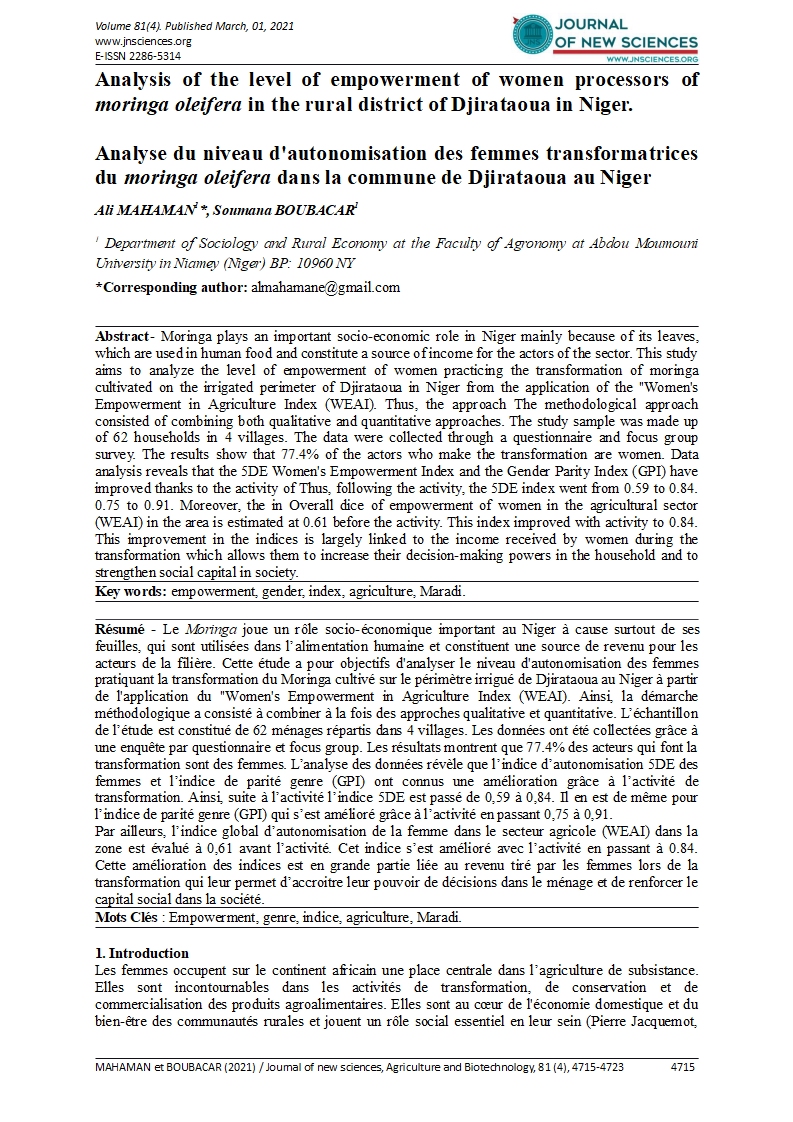

- Category: Volume 81
- Hits: 2785
Analysis of the level of empowerment of women processors of moringa oleifera in the rural district of Djirataoua in Niger.
Analyse du niveau d'autonomisation des femmes transformatrices du moringa oleifera dans la commune de Djirataoua au Niger
Ali MAHAMAN1
Soumana BOUBACAR1
1 Department of Sociology and Rural Economy at the Faculty of Agronomy at Abdou Moumouni University in Niamey (Niger) BP: 10960 NY
Abstract- Moringa plays an important socio-economic role in Niger mainly because of its leaves, which are used in human food and constitute a source of income for the actors of the sector. This study aims to analyze the level of empowerment of women practicing the transformation of moringa cultivated on the irrigated perimeter of Djirataoua in Niger from the application of the "Women's Empowerment in Agriculture Index (WEAI). Thus, the approach The methodological approach consisted of combining both qualitative and quantitative approaches. The study sample was made up of 62 households in 4 villages. The data were collected through a questionnaire and focus group survey. The results show that 77.4% of the actors who make the transformation are women. Data analysis reveals that the 5DE Women's Empowerment Index and the Gender Parity Index (GPI) have improved thanks to the activity of Thus, following the activity, the 5DE index went from 0.59 to 0.84. 0.75 to 0.91. Moreover, the in Overall dice of empowerment of women in the agricultural sector (WEAI) in the area is estimated at 0.61 before the activity. This index improved with activity to 0.84. This improvement in the indices is largely linked to the income received by women during the transformation which allows them to increase their decision-making powers in the household and to strengthen social capital in society.
Key words: empowerment, gender, index, agriculture, Maradi.
Résumé - Le Moringa joue un rôle socio-économique important au Niger à cause surtout de ses feuilles, qui sont utilisées dans l’alimentation humaine et constituent une source de revenu pour les acteurs de la filière. Cette étude a pour objectifs d'analyser le niveau d'autonomisation des femmes pratiquant la transformation du Moringa cultivé sur le périmètre irrigué de Djirataoua au Niger à partir de l'application du "Women's Empowerment in Agriculture Index (WEAI). Ainsi, la démarche méthodologique a consisté à combiner à la fois des approches qualitative et quantitative. L’échantillon de l’étude est constitué de 62 ménages répartis dans 4 villages. Les données ont été collectées grâce à une enquête par questionnaire et focus group. Les résultats montrent que 77.4% des acteurs qui font la transformation sont des femmes. L’analyse des données révèle que l’indice d’autonomisation 5DE des femmes et l’indice de parité genre (GPI) ont connus une amélioration grâce à l’activité de transformation. Ainsi, suite à l’activité l’indice 5DE est passé de 0,59 à 0,84. Il en est de même pour l’indice de parité genre (GPI) qui s’est amélioré grâce à l’activité en passant 0,75 à 0,91. Par ailleurs, l’indice global d’autonomisation de la femme dans le secteur agricole (WEAI) dans la zone est évalué à 0,61 avant l’activité. Cet indice s’est amélioré avec l’activité en passant à 0.84. Cette amélioration des indices est en grande partie liée au revenu tiré par les femmes lors de la transformation qui leur permet d’accroitre leur pouvoir de décisions dans le ménage et de renforcer le capital social dans la société.
Mots Clés : Empowerment, genre, indice, agriculture, Maradi.

